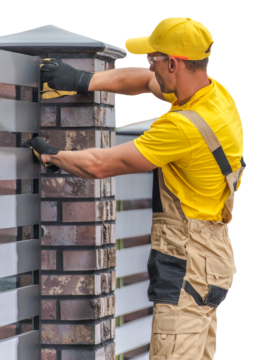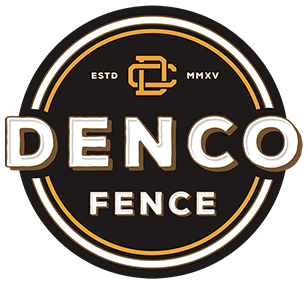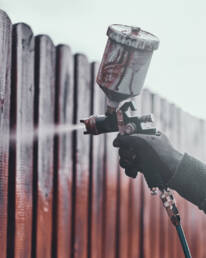Denver temperatures still reflect the autumn season -and we’re still pouring our pumpkin lattes, but everyone knows this signifies that winter is just around the corner. Winter weather in Denver is much milder than in other towns and cities in Colorado, but precautions must still be taken to protect your fence, at least if you want to see it standing in the same condition this time next year.
Three Reasons Why Winterizing Your Fence is so Important
Winter poses a threat to any fence, although the type and severity of potential damage vary from one material to another. Protecting your fence against this potential damage is important. Whether your fence protects your home from outsiders or encloses the garden, it needs TLC to continue serving those needs.
1. Cold Winter Takes a Toll on Fencing
Some materials suffer more than others but all fence types are at risk of some damage. Failure to prepare the fence for the winter cold season increases the risk of destabilization and problems like:
- Decreased protection from nosey neighbors, intruders, etc.
- Reduced curb appeal
- Damages and expensive repair costs
- Loss of fence longevity/need to replace fencing sooner
2. Protect Your Investment
No two homeowners spend the same amount of money on Denver fence installation, however, we do know the costs were considerable enough that you want to protect that investment. The easiest way to do this is by winterizing your fence before cold weather hits.
A fence that is properly taken care of will last many years more than a fence that is left to suffer in the cold, wet winter season without proper winterization. When you want to get your money’s worth from your fence, simple winter preparation can do the trick.
3. Save Time and Money in the Future
HomeAdvisor reports fence repair cost averages $584 with most homeowners paying between $300 – $410 for repairs. Fence replacement costs average $2,898 across the country.
Many homeowners take care of winterization tasks themselves and never reach out to professionals. This saves a ton of money. Even when professional fence winterization help is needed, the costs are substantially lower than repair costs.
Winterizing the fence now saves time as well. Any minor damage to the fence will grow in size until repairs have been made. This means more time and money to repair the fence when summer comes around.
You won’t need to stop what you are doing to call Denco out to make repairs when you schedule fence winterization before the cold season settles into the city. All in all, winterizing your fence saves substantial sums of money and time.
We’ll discuss below the simple ways to winterize your fence. Should you require professional fence winterization help, we are standing by ready to assist in any way we can, all at a cost considerably less than the cost of a minor repair.
How to Winterize Your Fence
The method of winterization your fence requires depends on the material. Learn below more about winterizing the most popular fence materials.
Vinyl Fencing
Vinyl fences protect many Denver homeowners and add curb appeal to the property. It’s structurally sound, affordably priced and easy to install, and easy to care for. Winterizing a vinyl fence is pretty simple.
Inspecting the fence is the first step in the winterization process. Look around the entire perimeter of the fence and make note of damage such as missing or loose panels or screws. Repair these issues as soon as possible.
After making repairs, the next step is cleaning the fence. You can use a power washer to clean a vinyl fence to remove dirt and debris that can damage the structure. You may also notice mold or algae on the fence after it has been cleaned. If you notice spots or stains, give Denco a call for additional help that will protect your fence.
Galvanized Steel
Galvanized steel is used in many ornamental fences that once were made from wrought iron. Galvanized steel is easier to maintain in cold weather than wrought iron but offers the same appealing look. If your fence is made from galvanized steel, its coating serves as the first means of protection against cold weather, snow, rain, hail, and other weather elements.
As with any fence material, the first step in winterizing your galvanized fence is to inspect it for damage. Scratches, scraps, and rust are common problems this fence material can sustain. If you notice damage, powder coating is your friend and can do wonders to improve the fence material and protect it against further damage.
Aluminum Fencing
Of the different fencing materials around, aluminum fencing is the trickiest to winterize. It’s more resistant to rust than some metal fencing materials but can be difficult to take care of when it gets wet.
Add to this the fact that homeowners often neglect the fences, even unintentionally, leaving the material prone to damage. If you want to ensure your aluminum fence protects your home for many years ahead, winterizing can benefit the situation greatly.
Inspect the fence for signs of damage and make repairs with spray paint. If you notice rust, scrub it down with a brush. Powder coating the metal can also decrease damage.
Wooden Fences
Perhaps the most popular fence material in Denver and the entire country, wooden fences add significant beauty to a property but also pose the biggest risks of damage. If you own a wooden fence, winterization is extremely important.
The type of wood species used to build the fence can determine the best methods of winterizing since species like cedar are especially notorious for damage. When you know the type of wood species used in the construction of your fence, you know what you are up against come winter.
Wet, cold weather can significantly damage wood fences in Denver. If you own a wood fence, calling Denco for winterization help is the best solution. We can inspect the fence to ensure that it’s not been damaged by moisture as well as add coating that will help protect the fence against moisture and dampness, the biggest causes of damage to a wooden fence.
If you need help winterizing your fence, call Denco at 303.223.6902 or shoot us an email at inquiries@dencofence.com.

Need an expert opinion? Talk to our experts today!
When you talk to our experts at Denco Fence Company, we’ll help you compare fence styles, share design ideas, and answer any questions along the way. If you’re looking to build or repair a fence that you and your neighbors are going to love, get a free estimate and let us help bring your project to life.

